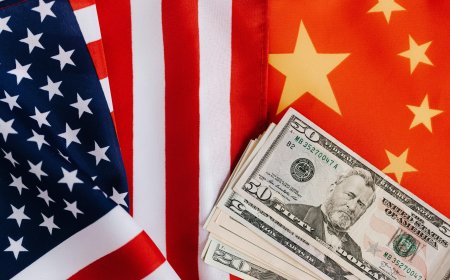10 Inventions That Built the Modern Economy
From steam engines to smartphones, explore the inventions that transformed economies and shaped today’s global world.

The economy as we know it—globalized, digital, interconnected—did not appear overnight. It is the product of centuries of innovation. Certain inventions didn’t just make life easier; they rewrote the rules of trade, productivity, and human potential.
Here are the ten inventions that built the modern economy, each a cornerstone of how nations create wealth and people live their lives.
1. The Printing Press: Knowledge for the Masses
When Johannes Gutenberg developed the movable-type printing press in the 15th century, information ceased being the privilege of the elite.
Economic Impact
- Enabled mass literacy, creating demand for books and newspapers.
- Accelerated the spread of scientific ideas and economic theories.
- Facilitated contracts, accounting manuals, and the early financial system.
The printing press was the original “information technology,” sparking revolutions in trade and finance.

2. The Steam Engine: Powering the Industrial Revolution
James Watt’s steam engine, refined in the late 18th century, transformed industries. No longer tied to rivers or windmills, factories could operate anywhere.
Transformations
- Expanded coal, iron, and textile production.
- Powered locomotives and ships, reducing transport costs.
- Enabled urbanization and mass employment.
The steam engine created not only industrialization but also capitalism as a global system.
3. The Telegraph: The First Internet
Before email, there was the telegraph. Samuel Morse’s invention in the 1830s allowed messages to travel across continents in minutes, not weeks.
Why It Mattered
- Gave rise to global financial markets by synchronizing information.
- Connected traders, governments, and militaries instantly.
- Reduced uncertainty in commerce, fueling international trade.
The telegraph turned the world into a network long before fiber optics.
4. Electricity: The Lifeblood of Modern Economies
Thomas Edison, Nikola Tesla, and Michael Faraday turned electricity into usable energy in the late 19th century.
Economic Effects
- Extended workdays with artificial lighting.
- Powered factories, elevators, and transportation.
- Enabled telecommunications, computers, and the digital revolution.
Electricity became the invisible currency of economic growth.
5. The Internal Combustion Engine: Mobility for All
From cars to airplanes, the internal combustion engine (ICE) reshaped economies by accelerating mobility.
Impacts
- Created global oil industries and reshaped geopolitics.
- Supported suburbanization and car-centric economies.
- Opened global tourism and international supply chains.
Without ICE, globalization in its modern form would not exist.
6. The Telephone: Commerce in Real Time
Alexander Graham Bell’s 1876 telephone made voice-to-voice communication possible across vast distances.
Economic Significance
- Allowed rapid business negotiations.
- Reduced transaction costs in banking, shipping, and trade.
- Gave rise to telecom industries worth trillions today.
The telephone didn’t just connect people—it connected markets.
7. The Computer: The Machine That Thinks
By the mid-20th century, computers shifted from room-sized calculators to tools of economic power.
Key Transformations
- Automated accounting, payroll, and logistics.
- Enabled data analysis, modeling, and complex financial markets.
- Created entirely new industries—from software to cybersecurity.
The computer made the global economy not only faster but also smarter.

8. The Internet: The Digital Marketplace
Born from U.S. defense research, the internet became the most powerful economic engine since the steam engine.
Economic Disruptions
- Enabled e-commerce giants like Amazon and Alibaba.
- Created digital services—from Netflix to Uber.
- Made remote work and outsourcing a global norm.
The internet blurred borders, creating a truly global economy.
9. The Credit Card: Money Without Cash
Introduced in the 1950s, credit cards revolutionized personal finance.
Why It Mattered
- Stimulated consumer spending and retail expansion.
- Facilitated international travel and tourism.
- Laid the foundation for digital payments and fintech.
Credit shifted economies from cash-driven to consumption-driven.
10. The Smartphone: The Economy in Your Pocket
The iPhone’s debut in 2007 marked the beginning of an economy where commerce, communication, and creativity fit in one device.
Impacts
- Enabled mobile banking, fintech, and cryptocurrency.
- Expanded digital labor markets via gig platforms.
- Turned developing nations into participants in global trade through mobile access.
The smartphone condensed centuries of economic invention into a handheld hub.
Beyond Invention: The Economy as Innovation
Each invention built on its predecessors, weaving a fabric of productivity and connectivity. Steam powered factories, electricity lit them, the telephone connected them, and the internet digitized them.
The common thread? Every invention reduced friction—the time, distance, or cost separating people and markets. The modern economy is not just about machines, but about efficiency.
Looking Ahead: The Next Great Economic Inventions
What could rival the internet or steam engine? Experts point to:
- Artificial Intelligence (AI): Automating decision-making and productivity.
- Green Energy Technologies: Reinventing economies for sustainability.
- Quantum Computing: Solving problems beyond today’s computational limits.
The next economic leap may not be a machine but a system that balances growth with responsibility.
Conclusion: From Steam to Screens
The modern economy is a mosaic of invention. Each breakthrough, from the printing press to the smartphone, redefined how we create, exchange, and consume wealth.
If history teaches us anything, it is this: economies are not built by money alone, but by imagination made real. The inventions of tomorrow may yet eclipse those of today, but their legacy will always trace back to the steam, sparks, and screens that built the world we live in.
FAQs
Q1: What invention most directly shaped the global economy?
A1: The steam engine, as it powered the Industrial Revolution, creating modern capitalism.
Q2: Why was the printing press economically important?
A2: It democratized knowledge, boosting literacy, trade manuals, and financial systems.
Q3: How did the internet change economic power?
A3: By enabling e-commerce, global supply chains, and remote services.
Q4: Which invention drives consumer economies today?
A4: The smartphone, as it merges communication, finance, and commerce.
Q5: What’s the next major economic invention?
A5: Likely AI and renewable energy technologies, shaping sustainable growth.
What's Your Reaction?
 Like
0
Like
0
 Dislike
0
Dislike
0
 Love
0
Love
0
 Funny
0
Funny
0
 Angry
0
Angry
0
 Sad
0
Sad
0
 Wow
0
Wow
0






































































